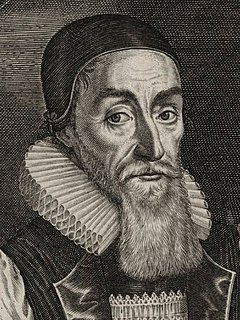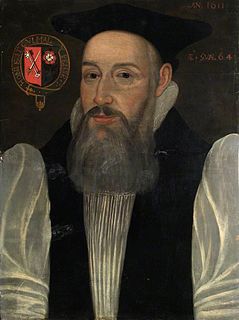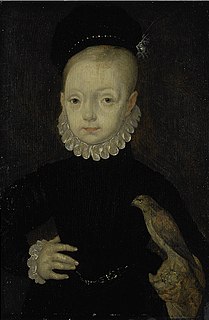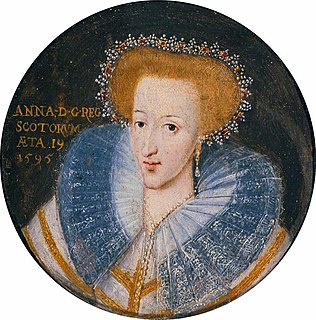Related Research Articles

Lancelot Andrewes was an English bishop and scholar, who held high positions in the Church of England during the reigns of Elizabeth I and James I. During the latter's reign, Andrewes served successively as Bishop of Chichester, of Ely, and of Winchester and oversaw the translation of the King James Version of the Bible. In the Church of England he is commemorated on 25 September with a Lesser Festival.

The Rev. Prof. Ralph Cudworth was an English Anglican clergyman, Christian Hebraist, classicist, theologian and philosopher, and a leading figure among the Cambridge Platonists. From a family background embedded in the early nonconformist environment of Emmanuel College where he studied (1630–45), he became 11th Regius Professor of Hebrew (1645–88), 26th Master of Clare Hall (1645–54), and 14th Master of Christ's College (1654–88). He was a leading opponent of Thomas Hobbes's political and philosophical views, and his magnum opus was his The True Intellectual System of the Universe (1678).

1680 (MDCLXXX) was a leap year starting on Monday of the Gregorian calendar and a leap year starting on Thursday of the Julian calendar, the 1680th year of the Common Era (CE) and Anno Domini (AD) designations, the 680th year of the 2nd millennium, the 80th year of the 17th century, and the 1st year of the 1680s decade. As of the start of 1680, the Gregorian calendar was 10 days ahead of the Julian calendar, which remained in localized use until 1923.

Joseph Hall was an English bishop, satirist and moralist. His contemporaries knew him as a devotional writer, and a high-profile controversialist of the early 1640s. In church politics, he tended in fact to a middle way.

Samuel Rawson Gardiner was an English historian, who specialized in 17th-century English history. He is the foremost historian of the Puritan revolution and the English Civil War.

Thomas Morton was an English churchman, bishop of several dioceses. Well-connected and in favour with James I, he was also a significant polemical writer against Roman Catholic views. He rose to become Bishop of Durham, but despite a record of sympathetic treatment of Puritans as a diocesan, and underlying Calvinist beliefs shown in the Gagg controversy, his royalism saw him descend into poverty under the Commonwealth.

Richard Corbet was an English clergyman who became a bishop in the Church of England. He also left behind a reputation as a humorist and as a poet, although his work was not published until after his death and in unreliable editions.

Arthur Lake was Bishop of Bath and Wells and a translator of the King James Version of The Bible.
George Downame, otherwise known as George Downham, was an author of influential philosophical and religious works who served as Bishop of Derry during the early years of the Plantation of Ulster. He is said to have been a chaplain to both Elizabeth I and James I.

Thomas Bilson was an Anglican Bishop of Worcester and Bishop of Winchester. With Miles Smith, he oversaw the final edit and printing of the King James Bible. He is buried in Westminster Abbey in plot 232 between the tombs of Richard II and Edward III. On top of his gravestone there is a small rectangular blank brass plate, which says the following:—

James Montague was an English bishop.
Walter Balcanquhall was a Scottish clergyman who became a staunch royalist and supporter of the church policy of Charles I of England. He was chosen by James I as a delegate from the Church of Scotland to the Synod of Dort.
John Stoughton (1593?–1639) was an English clergyman, of influential millennial views. He was the stepfather and preceptor in their youth of Ralph Cudworth and James Cudworth.

Sir Peter Young (1544–1628) was a Scottish diplomat, Master Almoner, and tutor to James VI of Scotland.
Richard Mocket (1577–1618) was an English churchman and academic, Warden of All Souls' College, Oxford from 1614.
Robert Woodford (1606–1654) was an English lawyer, best known for his extensive diary, which covers the period 1637–1641.
Francis Newton was an English clergyman who served as Dean of the Winchester Cathedral from 1565 until his death in 1572.
The Rev. Dr Ralph Cudworth (1572/3–1624) was a scholar and conforming Anglican minister of puritan sympathy who is best known as the father of the philosopher, The Rev. Prof. Ralph Cudworth (1617–88), and the Plymouth Colony emigrant, soldier, and colonist, General James Cudworth (1612–82). A student, graduate, and Fellow of Emmanuel College, Cambridge, he was recognized by his more famous contemporaries for his scholarship and preaching. He was Rector of the College living of Aller, Somerset (1610–24), and later became one of the chaplains to James I. His own calling and university connections provide the intellectual background to the careers of his children, reinforced by family connections, through his marriage with the puritan magistracy and promoters of the nonconformist emigrations to New England.
John Durel (1625–1683), John Durell, or Jean Durel, was a cleric from Jersey, known for his apologetical writing on behalf of the Church of England. He became dean of Windsor in 1677.

Elizabeth or Elspeth Gibb was a Scottish courtier.
References
- ↑ Oxford Dictionary of National Biography Online (ODNB), "John Young" by Kenneth Fincham
- ↑ F. R. Goodman, ed. The Diary of John Young, S.T.P.: Dean of Winchester, 1616 to the Commonwealth (London, 1928), pp. 6-7
- ↑ ODNB "John Young"
- ↑ Goodman, ed. Diary, pp.32-33, Appendix; W. P. W. Phillimore Hampshire Parish Registers, Marriages, etc. Volume IV (London, 1902) p. 34
- ↑ Hugh W. Young, Sir Peter Young, Knight of Seaton (Edinburgh: 1896) p. 86; Calendar of State Papers, Domestic, 1611-1618, p. 555
- ↑ Calendar of State Papers, Domestic, 1623-1625, pp. 320.
- ↑ Nicholas Tyacke Anti-Calvinists: The Rise of English Arminianism, c. 1590-1640 (London, 1987), pp. 92-93
- ↑ ODNB "John Young"; Julian Davies The Caroline Captivity of the Church: Charles I and the Remoulding of Anglicanism, 1625-1641 (London, 1992), p. 99
- ↑ Calendar of State Papers, Domestic, 1631-1633, p. 18; Goodman, ed. Diary, p. 16.
- ↑ Goodman, ed. Diary, p. 124
- ↑ Julie Spraggon Puritan Iconoclasm During the English Civil War (London, 2003) p. 54; Angliae Ruina or England's Ruine (London: 1647) pp. 223-224.
- ↑ J.W. The Taking of Winchester, by Parliament Forces (London: 1642) p. A4 (Thomason Tracts, E.245.14)
- ↑ ODNB "John Young"